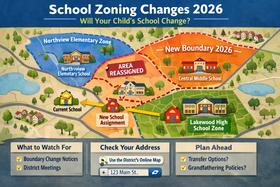During his time in office, President Barack Obama unveiled his proposal for overhauling the No Child Left Behind Act. This is a move of tremendous importance to public education. The NCLB Act was supported by both Democrats and Republicans in Congress when George W. Bush introduced it in 2001, but many education policy workers and politicians have become critical of the law in the years since its passage.
The law has come under attack for several reasons:
- Encourages Teachers to “Teach to the Test.” Critics say that the law has demoralized teachers and forced them to “teach to the test” rather than making instructional decisions based on the best interests of students.
- Encourages States to Dumb Down Standards. Because the standardized tests which are so important to NCLB are based on state standards, the law created what Secretary of Education Arne Duncan calls a “perverse incentive” for states to make their standards as low as possible, ensuring that a maximum number of students achieve passing scores.
- “Utopian” Goals. The Obama administration, according to the New York Times, has called NCLB’s goal that 100% of public school students will achieve proficiency in reading and math “utopian.”
This video looks at some of the issues with No Child Left Behind.
President Obama’s Proposed Changes
To fix the weaknesses of the No Child Left Behind Act, the Obama administration is proposing several changes:
Focus on the Lowest-Performing Schools
The New York Times reports that under the current incarnation of NCLB, one in three of the nation’s 98,000 schools is branded as failing, which is “far more than any level of government can help.” Obama’s new law would focus on the nation’s 5,000 “most chronically failing schools” rather than attempting to fix all of the nation’s schools at once.
Create a More Nuanced Grading System for Schools
One of the biggest frustrations that teachers and school administrators have voiced about the current NCLB law is that under its standardized-test-based standards, far too many schools end up receiving failing grades, even when these schools are making progress in closing achievement gaps and raising overall student achievement.
President Obama’s proposed changes would do away with the pass-fail grading system currently in place and replace it with a scoring system that would take into account not only test scores, but also factors like student attendance, graduation rates, individual students’ academic progress from year to year, and a school’s “learning climate.”
This video views No Child Left Behind critically as a failure.
Instead of Universal Proficiency, the Goal is Universal High School Graduation
The proposed changes would also do away with the goal that all public school students achieve proficiency in reading and math. Instead, the new education law would have as its goal that every public school student in the United States graduatefrom high school prepared for college and a career.
Encourage States to Adopt National Curriculum Standards
The administration’s new plan would also attempt to address the problem of states setting mediocre standards in order to ensure that students achieve “proficiency.” The proposal would require states to adopt “college- and career-ready standards” (in other words, standards that meet or exceed a minimum level of rigor) in order to qualify for certain federal education funds.
Reactions to the Proposed Changes
Of course, overhauling one of President Bush’s cornerstone programs comes with criticism.
Republicans Concerned About National versus Local Control of Educational Decisions
Some Republican politicians are critical of the proposed changes. Business Week reports that the plan to reward states that adopt national curriculum standards with more federal money has been met with disapproval from Minnesota Republican Representative John Kline. Kline, the senior Republican on Congress’ education committee, noted that Minnesota’s governor chose not to adopt national standards because Minnesota’s state math standards were more rigorous than the national standards.
However, Business Week notes that overall, Obama’s proposed education plan has experienced more success in receiving bipartisan support than have his proposals concerning health care or the economy.
Speaking to the Christian Science Monitor, Michael Petrilli, a vice president at the Thomas B. Fordham Institute who served in the Education Department during George W. Bush’s first term, said that President Obama’s proposed changes will turn more control back to districts and states, which is usually what Republicans want.
Teachers’ Unions Concerned that Plan Will Place Unfair Burdens on Teachers
Randi Weingarten, president of the national teachers’ union American Federation of Teachers, told the New York Times that “From everything that we’ve seen, this blueprint places 100 percent of the responsibility on teachers and gives them zero percent of the authority.”
This video offers the viewpoint of teachers on No Child Left Behind.
Some Democrats Concerned about Losing Focus on Achievement Gap
Some Democrats are concerned that the new incarnation of No Child Left Behind will fail to address the achievement gap that exists between African-American and Hispanic students and their Caucasian counterparts. The current version of NCLB was designed to address the achievement gap, but the new version places less emphasis on the achievement gap and more emphasis on preparing every American student for either college or a career.
Speaking to the New York Times, Christopher Edley Jr., dean of Boalt Law School at University of California, Berkeley, and a former official in the Clinton administration said, “I worry about retreating from the notion of quality education as a civil right.”
These are certainly interesting times for public education, and while we may be leaving NCLB behind, we will be welcoming new policies that will hopefully improve our children’s education.
Questions? Contact us on Facebook. @publicschoolreview












